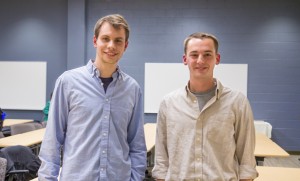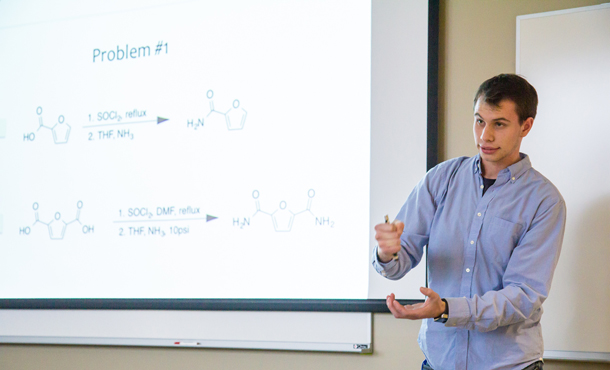The world is running out of petroleum. A dwindling supply of petroleum is troubling not only to automobile, plastic, and energy users, but also to organic chemists who heavily depend on components distilled from petroleum to fuel their chemical reactions.
Researchers, including Eastern Mennonite University junior Charles Good, are beginning to address this problem in a new field called “green chemistry,” which, in part, aims to find renewable structural alternatives to petroleum that could be used in common petroleum-based commodities.
Toward this goal, Good spent the summer of 2014 in Fargo, North Dakota, as a student researcher at North Dakota Sate University. His objective was to develop a green synthesis of monomers from biomass. Good presented his work in the Fall Student Research Symposium at EMU on Dec. 5, 2014.
Good was part of a 10-week program funded by the National Science Foundation called “research experience for undergraduates” or REU. “I wanted to do research outside of EMU,” Good said, because “I wanted to know what it would be like to be part of a bigger facility.”

Although Good came up against challenges that made it difficult to get a conclusive outcome (with rueful cheer, he says research is “hitting your head against the wall for 95 percent of the time in order to get a minor result”), the overall experience was extremely valuable for him. He recommends all chemistry students pursue such an experience between their sophomore and junior years, because it can have a positive impact on their later studies and opportunities.
“REU was an amazing door opener,” he says, but one he could not have gotten without the support, encouragement and education he received from his EMU professors – especially chemistry professors Tara Kishbaugh and Steve Cessna. “I think the professors are where EMU is strongest,” Good says. “They pay attention to students who are interested in research opportunities and work hard to make those opportunities possible.”
Research opportunities for EMU students do not necessarily have to be through other institutions, but can be in partnership with an EMU professor, like the project that senior Zach Gish worked on over the summer and fall of 2014.
Gish and two biomedicine graduate students worked under biology professor Roman Miller studying ethanol teratology in mice, which translates to how alcohol affects prenatal development. The students were most interested in whether substances called anthocyanins could protect against ethanol-induced prenatal developmental deficiencies.
Over the summer, the three students worked with 36 pregnant female mice who were administered ethanol or saline through intraperitoneal injections injections five to seven days following impregnation. They then daily weighed the mice to document the fetuses’ developmental progression and met with Miller weekly to report their progress. At the end of the summer the students harvested the fetuses, which they spent the fall studying.
Gish shared his results at the fall symposium: Statistical analysis showed that the binge alcohol supplemented with anthocyanins group was protected from gross developmental deficiencies over the binge alcohol (alone) group, when compared to the control group (without alcohol). Gish delivered his report to a packed audience in one of the new Suter Science Center classrooms.
While the summer was about caring for the pregnant mice and tracking their process, the fall semester was all about results and collecting data, Gish told an EMU reporter. He explained that over the fall they tried to collect whatever data they could before spring at which time they plan to embed the fetuses with paraffin wax and look at them on a cellular level.
Gish cited this opportunity for one-on-one research as one of the most valuable aspects of his EMU education. “The EMU biology program has provided me with numerous opportunities I would not have found elsewhere,” he said. Like Good, these opportunities arose from the relationships he has developed with his professors whose “direction and guidance have been invaluable.”
Gish plans on taking the MCAT in April 2015 and hopes to start medical school in the fall of 2016.
Good intends to go to graduate school for a yet undecided field of chemistry and hopes to eventually finish a PhD in the subject. The Fall Student Research Symposium is part of the year-long Suter Science Seminars series, which resumes after Christmas break on January 12, 2015.
